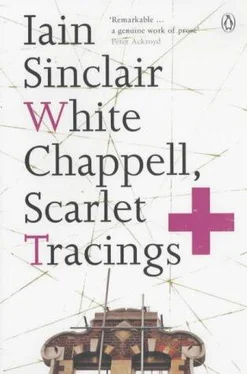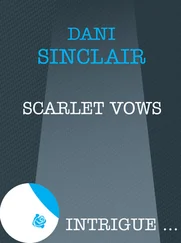‘I’d work into the night: the moon gibbous and threatening. She wants me out, got her yoga routine to complete. I’m getting nowhere, a couple of feet a day. The ceiling’s like treacle; no blood in my arms.
‘And walking back to the underground, all these bandaged patients behind tall windows, convalescent, lobotomised, sitting at individual tables waiting for food, being watched by children’s television.
‘I buy a Standard and read of the murder, that morning, in a near-by street, of James Pope Hennessy, the biographer of Queens. He’s been stabbed in the head. Died from inhaling his own blood.
‘When I get home I dig among my Stevensons and discover that 16 Chepstow Place was not the address of the Suicide Club, but the address of a Mr Bartholomew (ha!) Malthus, who inhabits that story, suffering a “Melancholy Accident” and falling to his death “over the upper parapet in Trafalgar Square, fracturing his skull and breaking a leg… Mr Malthus, accompanied by a friend, was engaged in looking for a cab…”
‘In November I saw reviewed in The Sunday Times the book that Pope Hennessy was working on in his study at the time of that definitive interruption: a biography of Robert Louis Stevenson.
‘My wages were gone, forty pounds, the precise amount required for membership of the Suicide Club.’
Now the line of new light drives across the floor. The gas tongue so pale its power has gone. The marriage is almost on us. We have slept on our shields. Man to man to man, silent, sunk, the unwilled exchange, the talk brought to its finish. No more to be done, the word is — on.
To the obelisk. Unspoken. It is time to walk, return to the domestic chamber, to Camberwell, to dress the day.
But first we will walk that small mystery, make that connection: from the obelisk of St Luke, Old Street, to the demolished obelisk of St John, Horseydown, by way of the extinguished church of Mary Matfellon, Whitechapel. The three enclosures of ruin. Unacknowledged, but not concealed. St Luke, roofless, wild space in a border of stone; St John, a rim of the original onto which a place of business has been grafted; and Mary Matfellon, nothing, a field with a diagram in the grass, a stain only. The shunned Apostles.
The less they are, the stranger they become.
The walk has nothing to do with lines of force, immaculately ruled patterns, stern geometry of will, pentagrams, grids, brass-rule control. It is older and wilder. The triple spiral, finger print, found at New Grange. The spiral that winds out of Clerkenwell into Whitechapel into Southwark. It is not precise, it can’t be measured. But it is invoked. We want it and that is its truth.
The freshness of the day and the obelisk an absolute white, white beyond white, against the dim dirt-grained stone of the body of the church. The fence is breached and the door to the tower unlocked.
This is an act of morning.
We are lifted. The steps in time, wide. Counting the climb as if we would never again descend to the same city.
And raising ourselves by the ascent of this risk. Entering the blade. Beyond the door of light — the skin of the local is shaken. We climb, turning, winding into the tower but, strangely, it becomes a descent . We go down towards the sky.
A great bell hangs, a bulk of danger. Old wood. A pillar fallen across two discs or bowls; upturned scales. Spidery darkness. Cool breath. The soupy smell of stone dust, cloth dust, dust dying into dust; ropes on the floor, broken boards. We climb into the dark.
And now Jack is framed across the circular space of the window where the clock once hung. It is the ghost of a rose, unfolding rose of time, twisted into iron: it is a filter, projecting the rose onto the city. Jack’s outstretched arms break the circle, Adam Kadmon.
I turn from the light to Joblard. He is leaning back against the skirts of the bell, his breath gone. Out of the heat vortex. His face has died. He is white, bearded in shadows. It is the face of my father. The Father of Lights.
His spine resting on the buried bell. The bell within the obelisk. The cancelled bell that has been hidden from the world.
A flutter of birds against the window. Bird lime. Stench of old feathers.
We turn away, our prayers are made. Down into the face of the lion: Bunhill, Finsbury, Sun, Appold, Pindar, Spital, Steward, White’s, Thrawl, Matfellon, the path of old stone: by the Minories to the Tower, to Horseydown and the Old Kent Road.
To be shaved, washed, suited.
Joblard’s room has been cleared of its detritus; the brown swallowed in pale shades, the windows polished, open to the new day. A white cloth spread.
The room-dividing panels have been forced back so that the space is doubled, lit through. Flowers, lace. And by these changes, and on this day, a marriage is made.
Nothing uses me to it.
James Hinton turned heel at Limehouse, would go no further: as if it could be walked out, as if he could unravel the pain, give it a fixed distance and stamp it down. His fists smashed against the iron gates, head bowed to his old enemy, the wind; force gone out of him. The high tower of St Anne’s church offered no resistance: it made the wind. Hinton obeyed the dead. He was one of them. A sensation not experienced by many mortals — to have no place among the living, to live less than those dead bones, those humps in the ground.
There was a horrible sense of continually walking into himself, falling behind, gone, dead on arrival. Seeing himself, leaning on the gate, a drowned man, the octagonal capped lantern of the tower rising from his head, cuckold, making him an insect. To be blown where the wind chose. The will was gone in him. He would not listen to his own death.
He turned towards annihilation, the labyrinth again, the secret heart. Saviour of women. There was nothing to fear. By passion would passion be killed. Prostitution is dead, I have slain prostitution.
In Church Passage, off Mitre Square, a woman is waiting. Think what a work had to be done! Blessed is he who has found his work! Nothing to be said; she lifts a hand and puts it upon his shoulder. Rust-coloured hair, her eyes have him, brown, wood varnish. He pulls her by the wrist. She drags behind him.
There is no drama, debate, discussion. She was waiting. And now it is she who is leading him into the narrow gash of Angel Alley. Black straw bonnet, tilted, some fur at her collar, three large metal buttons. Jaunty, a bit of a turn. Name is Kate. Unasked. Name is Conway. Name is Kelly. Tattoo on forearm. Name is Eddowes. Heavy workman’s boots, unlaced. Soap in her pocket, ribbons.
Hinton sniffing at her apron: God’s instrument. The maul. Within the passage; Hinton under the bell of her skirts, so many skins, so many layers. The print, Michaelmas daisies. Dark green petticoat, stained, not fresh. Hinton presses his face to her belly. She lolls back, complacent, a song from the halls, counting the line of bricks.
Nothing to fear; Hinton has her legs parted and is driving against her, bruising her, she is bumped repeatedly against the wall. He cannot finish it. Not blamed, the woman, for nothing. His arms under her stocking’d thighs; has her lifted from the ground, her boots kicking out. He touches the tip of her womb.
Turns her; now a dog, skirts thrown clear, clutching his fingers into her thighs, sweating, gasping. Rolls off her, still aflame, blood-charged, raw. His pocket-knife; hacks the buttons from her jacket, throws a coin at her feet. Returns. It cannot be drowned. Covered. Crushed. Kept down.
Crosses, through the traffic, the carts and carriages, the people: a wild shadow. He can hear nothing but the dead in their bells. The stones will not hold them. They will grow from the earth. Grave-words: re-sting, not ‘resting’. Hornets.
Читать дальше












